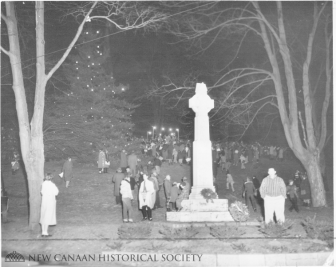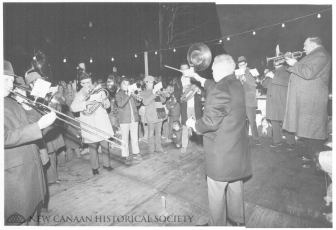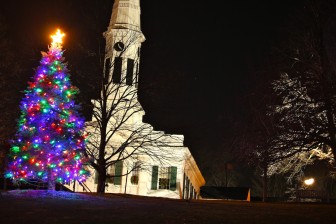Caroling at God’s Acre for Christmas is one of New Canaan’s most cherished events of the year, a nostalgic, Rockwellian gathering that brings the community together unlike any other celebration.

Caroling at God’s Acre. December 30, 1976. John Bukovcik photo, courtesy of the New Canaan Historical Society
New Canaan First Selectman Rob Mallozzi called it a “sacred and treasured New Canaan tradition.”
“It’s something that distinguishes New Canaan and its citizens above all the other towns around us,” he told NewCanaanite.com.
Held on the plot of land above which the Congregational Church was built—the institution upon which the town was founded, the caroling sees scores of New Canaanites descend each year on what literally is hallowed ground, as it is believed many of New Canaan’s settlers are still buried at God’s Acre.
But how did it start, and when?
The first documented instance of caroling at God’s Acre occurred on Christmas Eve in 1916, according to historian Mary Louise King’s book Portrait of New Canaan, published by the New Canaan Historical Society. At the time, the Civic League—founded six years earlier in 1910—was a prominent group in town, tasked with improving almost every aspect of living in New Canaan, including public health, sanitation and education.

Caroling at God’s Acre. December 30, 1958. Photo courtesy of the New Canaan Historical Society
The Civic League was responsible for sponsoring the New Canaan’s inaugural caroling, as a tree donated from neighboring Norwalk was brought to God’s Acre, decorated with ornaments and candles and was for the first time the center of the town’s Christmas Eve celebration.
In 1917, the same year the United States entered World War One, the Civic League bought and planted a Scotch pine tree from Hoyt’s Nurseries—the present-day location of Hoyt Farms Road neighborhood—at the southwest corner of God’s Acre. As recounted by King, it was New Canaan’s first Christmas tree.
Over the course of every year—and several different trees—New Canaan has celebrated Christmas with caroling every year much like the townspeople did in 1916. The only years the tree was not lit were in 1942 and ’43, as the United States was at war once again. A blackout imposed by the War Production Bond to conserve energy meant that the tree was to remain unlit, with the exception of the star that topped the tree, according to the historical record.

Caroling at God’s Acre. December 28, 1972. Syd Greenberg photo, courtesy of the New Canaan Historical Society
Another important component of the Christmas Eve caroling through the years has been the participation of the New Canaan Town Band. Established in 1831, the band is the second oldest band in the United States, and has provided instrumentation for carolers since the first celebration.
“It’s an honor to be a part of it,” band president Graydon Pihlaja said. “It’s really not about us—we’re just an accompaniment. The music is the people singing, and we’re just there to give them a tone for everyone to start with, so that everyone sings the same notes.”

God’s Acre, 2015. Credit: Terry Dinan
If this year’s Christmas Eve forecast holds true, the weather will be more like Easter than Christmas as temperatures are expected to hit 60 degrees during the day and remain well above 40 for most of the night.
Even so, Pihlaja feels the spirit of the holiday will supersedes anything Mother Nature might throw at revelers, good or bad.
“I’ve been out there when it’s been monsooning,” Pihlaja said. “And there’s still like two or three-hundred people out there, just die-hards. It’s very important to people. Their parents brought them, they’re bringing their kids. It’s really about getting the whole town together to sing.”